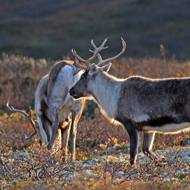Deadly brain disease detected in Europe

It is unclear currently if this is an isolated case or if the disease, which is difficult to detect is widespread in Europe.
Scientists have detected a highly contagious and deadly animal brain disorder. A reindeer infected with chronic wasting disease (CWD) was found during a routine tracking expedition in southern Norway.
It is the first known case of the fatal disease both in Europe and the first occurrence in this species worldwide, the journal Nature reports. Previously thought to be restricted to deer, elk and moose in North America and South Korea, the disease is shed through saliva, urine and faeces. It is unclear currently if this is an isolated case or if the disease, which is difficult to detect is widespread in Europe.
CWD occurs when cellular proteins (prions) become misshapen and aggregate predominantly in the brain causing behaviour changes, weight loss and coordination problems. As with the similar bovine spongiform encephalopathy (BSE) and variant Creutzfeldt-Jakob disease, CWD is incurable and fatal.
Sylvie Benestad, animal disease researcher at the Norwegian Veterinary Institute, performed a necropsy on the deer that was part of a free ranging herd in southern Norway’s alpine regions. She is quoted by Nature as saying: “It’s worrying of course, especially for animals, it’s a nasty disease”.
With importation an unlikely cause, suspicions are that the disease occurred spontaneously or jumped species from the sheep prion disease scrapie.
Glen Telling, prion disease researcher at Colorado State University in Fort Collins addressed the mystery of its origins. “The $64,000 question is what is the origin of this case of CWD in Europe. What we do know is that once CWD is detected in new locations, it typically takes a foothold in that location, and is difficult to eradicate.”



 The Animal and Plant Health Agency (APHA) has updated its online reporting service for dead wild birds.
The Animal and Plant Health Agency (APHA) has updated its online reporting service for dead wild birds.